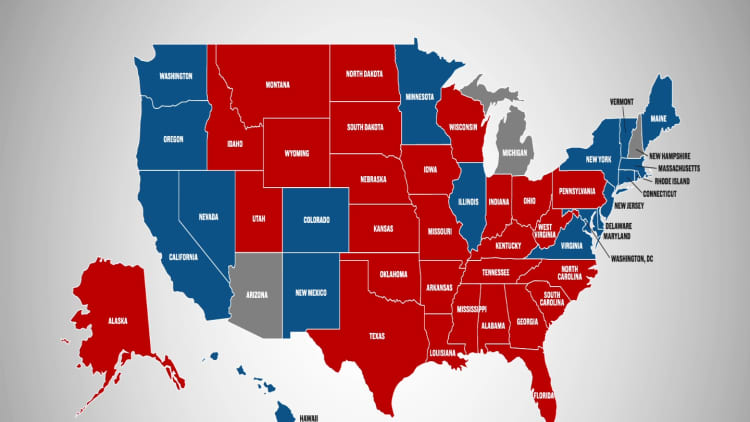
I was wrong. Totally, completely, laughably wrong.
For months I've written here that Donald Trump had little chance to win the White House. He did just that Tuesday night, shocking the world and sending tremors across global markets. I have plenty of company among pollsters and pundits who viewed a Trump win as a remote possibility given his behavior on the campaign trail and stratospheric negative ratings among voters.
But having company doesn't lessen the sting of completely missing the degree to which voters, especially white voters who delivered the White House to Trump, would take a big risk to send a message of anger and frustration to elite institutions.
I also underestimated Hillary Clinton's weaknesses as a candidate and the degree to which President Barack Obama's personal popularity would fail to transfer to the Democratic nominee.
Clinton, who could still wind up winning the popular vote, lost the Electoral College because she could not turn out the Obama coalition in big enough numbers in Michigan, Wisconsin, Pennsylvania, Florida, North Carolina and other critical states.
African-American voters who helped drive Obama to victories in 2008 and 2012 did not show up the same way for Clinton. And white voters in suburban and ex-urban counties in swing states who went for Obama did not do so in the same way for Clinton.
Trump, meanwhile, ran up the score in deeply red counties especially in the industrial Midwest where his message of restoring past manufacturing greatness, however fanciful, connected on a deep level. Resentment against immigrants and the cultural agenda of the left also clearly played a role.
It will take months to determine exactly how Trump won. But lack of enthusiasm for Clinton compared to Obama was clearly an enormous factor. Obama carried none of the baggage of scandal and decades in the public eye that Clinton brought to the race. He was never ensnared in a rolling story about the use of a private email server or questions about access to government by donors to a private foundation.
Clinton also suffered from historical trends that always make it hard for an incumbent party to hold onto the White House for three terms. And while the economy has shown significant improvement over the last several years, it never picked up enough or spread the gains well enough to provide any kind of significant boost to Clinton.
The question now is how Trump will govern, who he will appoint to top jobs and how he will relate to Republican leadership on Capitol Hill. Trump should have the ability to push through major parts of his agenda, though his trade policies will face skepticism as will promises to build a wall with Mexico and deport millions of undocumented immigrants.
The most positive scenario for markets and the economy would be a President Trump who bears little resemblance to the bombastic, often offensive candidate who appeared on the campaign trail. He has shown an enormous capacity for work, spending an extraordinary amount of time attending rallies across the country. If he harnesses that capacity to promote an agenda that includes significant infrastructure spending, and a rewrite of the corporate and individual tax code, he could improve some structural problems in the economy.
But he also represents a complete unknown in his dealings with foreign leaders and has often taken conflicting positions on a range of issues from entitlements to trade policy. There is simply no way to assess at this early moment what a Trump presidency will look like. There is only the opportunity to reflect on how so many of us got this whole election wrong for so long.
—Ben White is Politico's chief economic correspondent and a CNBC contributor. He also authors the daily tip sheet Politico Morning Money [politico.com/morningmoney]. Follow him on Twitter @morningmoneyben.


